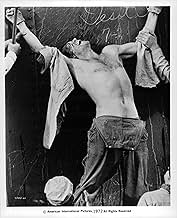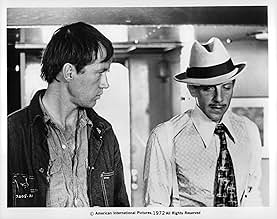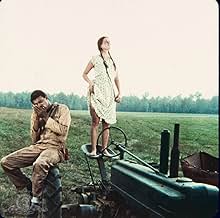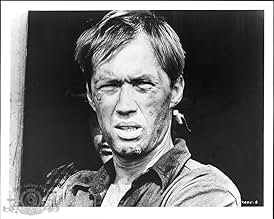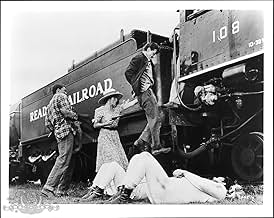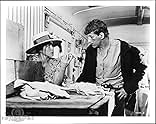VALUTAZIONE IMDb
6,0/10
11.856
LA TUA VALUTAZIONE
Durante la Grande Depressione, un sindacalista e una giovane donna diventano criminali per vendicarsi della gestione di una ferrovia.Durante la Grande Depressione, un sindacalista e una giovane donna diventano criminali per vendicarsi della gestione di una ferrovia.Durante la Grande Depressione, un sindacalista e una giovane donna diventano criminali per vendicarsi della gestione di una ferrovia.
- Regia
- Sceneggiatura
- Star
- Premi
- 1 candidatura in totale
David Osterhout
- McIver #2
- (as David R. Osterhout)
Grahame Pratt
- Emeric Pressburger
- (solo nei titoli)
'Chicken' Holleman
- M. Powell
- (solo nei titoli)
Harry Northup
- Harvey Hall
- (as Harry Northrup)
Jerry Cortez
- Sheriff
- (non citato nei titoli originali)
Louie Elias
- Boxcar Tough
- (non citato nei titoli originali)
Michael Fitzgerald
- Apple Peeler
- (non citato nei titoli originali)
Gura Lashlee
- Hobo
- (non citato nei titoli originali)
Gerald Raines
- Train Engineer
- (non citato nei titoli originali)
Recensioni in evidenza
Boxcar Bertha is an early Scorcese, made just on the eve of his highly personal breakthrough film Mean Streets. In other words, these were the days before he could call the shots and was merely a jobbing director. It's a cheap exploitation flick, and like most B-pictures it's a cash-in knock-off of a recent hit movie in this case Bonnie and Clyde. It crams in all the essential ingredients for the genre hold-ups, union men, pinkertons, chain gangs and, of course, boxcars along with a dash of nudity and gory violence to help it sell.
The story follows the same arc as its peers likable proles take to a life of crime to escape the depression, have a number of run-ins and adventures, until they eventually meet their downfall. The screenplay is fairly lazy and predictable, although the writers have tried to inject some depth and conflict to the characters. Bill, for example, struggles to reconcile his socialist values with his individualist criminal antics. Rake is ashamed of his cushy city roots and wants desperately to prove himself. Bertha herself is portrayed as a kind of happy-go-lucky individual with no real agenda apart from living the life she enjoys and being with the man she loves. Sadly these ideas are never fully explored, and tend to get lost behind the simplistic b-action setting.
Boxcar Bertha also happens to be surprisingly loaded with religious references, painting Bill as a Jesus-like figure. Most obvious of these is the highly symbolic ending, but there are a number of more subtle hints. A scene somewhere in the middle opens with David Carradine standing before a biblical fresco, and later in the city Barbara Hershey stops to look at a film poster for The Man who Could Work Miracles. The religious angle is something which actually runs through all of Scorcese's work, rarely stated out loud but always under the surface.
Scorcese's technical style is fairly functional and not too flamboyant, but there are some hints towards the methods he would later make his own. He relies very heavily upon the editing process for impact a dynamic cut emphasises every moment of action. There aren't too many of the lengthy tracking shots that he is known for, and what camera moves there are are shaky and poorly planned, even if he really is trying to make something of them. This is all understandable though planning elaborate camera moves is very time consuming, and apparently the shoot for this picture was a mere twenty-four days. Besides, snappy editing is a good way to get something out of next to nothing in a fast-paced action flick.
It's an interesting touch to see father and son actors John and David Carradine playing each others nemeses. Both are fine actors, although unfortunately the former was largely relegated to minor supporting parts in A pictures, while the latter was usually lumbered with lead roles in B pictures. Only occasionally did either of them get to shine, and Carradine Senior is particularly good here even if it is another small role. But the real standout here is Barbara Hershey in the title role. She gives Bertha a kind of playful innocence, but allows the character to mature and show more depth of emotion towards the end of the picture.
When all's said and done, Boxcar Bertha is a cut above the average cheapie, but only a small cut. Scorcese has done a fair job with the material, and there is an occasional surprising moment of quality. It's good fun too in many places, particularly the cheeky dialogue given to Bernie Casey (Von), as well as the Laurel and Hardy-like pinkerton agents. But it also has a dull plot, annoying musical score, cheep-and-cheerful production values and is just too short to really take off.
The story follows the same arc as its peers likable proles take to a life of crime to escape the depression, have a number of run-ins and adventures, until they eventually meet their downfall. The screenplay is fairly lazy and predictable, although the writers have tried to inject some depth and conflict to the characters. Bill, for example, struggles to reconcile his socialist values with his individualist criminal antics. Rake is ashamed of his cushy city roots and wants desperately to prove himself. Bertha herself is portrayed as a kind of happy-go-lucky individual with no real agenda apart from living the life she enjoys and being with the man she loves. Sadly these ideas are never fully explored, and tend to get lost behind the simplistic b-action setting.
Boxcar Bertha also happens to be surprisingly loaded with religious references, painting Bill as a Jesus-like figure. Most obvious of these is the highly symbolic ending, but there are a number of more subtle hints. A scene somewhere in the middle opens with David Carradine standing before a biblical fresco, and later in the city Barbara Hershey stops to look at a film poster for The Man who Could Work Miracles. The religious angle is something which actually runs through all of Scorcese's work, rarely stated out loud but always under the surface.
Scorcese's technical style is fairly functional and not too flamboyant, but there are some hints towards the methods he would later make his own. He relies very heavily upon the editing process for impact a dynamic cut emphasises every moment of action. There aren't too many of the lengthy tracking shots that he is known for, and what camera moves there are are shaky and poorly planned, even if he really is trying to make something of them. This is all understandable though planning elaborate camera moves is very time consuming, and apparently the shoot for this picture was a mere twenty-four days. Besides, snappy editing is a good way to get something out of next to nothing in a fast-paced action flick.
It's an interesting touch to see father and son actors John and David Carradine playing each others nemeses. Both are fine actors, although unfortunately the former was largely relegated to minor supporting parts in A pictures, while the latter was usually lumbered with lead roles in B pictures. Only occasionally did either of them get to shine, and Carradine Senior is particularly good here even if it is another small role. But the real standout here is Barbara Hershey in the title role. She gives Bertha a kind of playful innocence, but allows the character to mature and show more depth of emotion towards the end of the picture.
When all's said and done, Boxcar Bertha is a cut above the average cheapie, but only a small cut. Scorcese has done a fair job with the material, and there is an occasional surprising moment of quality. It's good fun too in many places, particularly the cheeky dialogue given to Bernie Casey (Von), as well as the Laurel and Hardy-like pinkerton agents. But it also has a dull plot, annoying musical score, cheep-and-cheerful production values and is just too short to really take off.
Roger Corman's indirect influence on the 70s movie renaissance is often overlooked. Many of that decade's key players served their apprenticeships on Corman's quickies. Directors like Coppola, Bogdanovich, Bartel and Demme, and actors like Nicholson, Hopper, Fonda, Dern, Stanton, and even De Niro.
Add Martin Scorsese to that list. 'Boxcar Bertha', his movie directly before the breakthrough 'Mean Streets', may not display his talent in full, but it is a surprisingly well shot and acted, and is an above average b-grade movie with a lot of entertainment value.
Like similar Corman productions from this period ('Bloody Mama', 'Dillinger', 'Big Bad Mama') it is a Depression era look at flamboyant criminals. An exploitation movie for sure, but exploitation with style and class. Barbara Hershey (who would reunite with Scorsese in seriously underrated 'The Last Temptation Of Christ') plays the title role, but the real star of the movie is her then real life partner David Carradine ('Kung Fu', 'Death Race 2000'), who gives a strong, charismatic performance. The supporting cast includes blaxploitation legend Bernie Casey ('Cleopatra Jones',etc.), Carradine's veteran character actor father John, and Scorsese/Ferrara regular Victor Argo ('Taxi Driver', 'King Of New York').
'Boxcar Bertha' is by no means one of Scorsese's greatest achievements, but it is nothing to be embarrassed about either. Check it out sometime. It's much better than you would think.
Add Martin Scorsese to that list. 'Boxcar Bertha', his movie directly before the breakthrough 'Mean Streets', may not display his talent in full, but it is a surprisingly well shot and acted, and is an above average b-grade movie with a lot of entertainment value.
Like similar Corman productions from this period ('Bloody Mama', 'Dillinger', 'Big Bad Mama') it is a Depression era look at flamboyant criminals. An exploitation movie for sure, but exploitation with style and class. Barbara Hershey (who would reunite with Scorsese in seriously underrated 'The Last Temptation Of Christ') plays the title role, but the real star of the movie is her then real life partner David Carradine ('Kung Fu', 'Death Race 2000'), who gives a strong, charismatic performance. The supporting cast includes blaxploitation legend Bernie Casey ('Cleopatra Jones',etc.), Carradine's veteran character actor father John, and Scorsese/Ferrara regular Victor Argo ('Taxi Driver', 'King Of New York').
'Boxcar Bertha' is by no means one of Scorsese's greatest achievements, but it is nothing to be embarrassed about either. Check it out sometime. It's much better than you would think.
Watching early films by classic directors in the midst of discovering their trademark style always proves to be an interesting endeavor, and Martin Scorsese's Boxcar Bertha is no exception. Made the year before Scorsese's breakthrough hit, and first tale of Italian American life on the streets, Mean Streets, Boxcar Bertha shows the legendary Scorsese adapting his own personal narrative style into a different niche, and attempting what he referred to as a "genre picture". Boxcar Bertha was first pitched as a simple exploitation film, but under the capable guiding hand of Scorsese, the final outcome is a highly enjoyable and surprisingly in depth portrait of the lifestyle and viewpoints of depression era railroad workers.
Even in this early work, Scorsese shows his almost unparalleled ability to create a shockingly vivid and humane portrait of the working class; while the film may not be set in little Italy, the same themes ring true and the characters' voices are once again perfectly captured, speaking out against repression from the upper classes and the harsh conditions of their everyday lives. Scorsese also demonstrates a knack for creating a particularly believable period look and feel; indeed, the film's set design is particularly impressive, and the audience seems to live and breathe the harsh fumes of the boxcar at the height of 1920s depression.
It's also interesting to watch the gestation of several of Scorsese's definitive film-making techniques, even in an earlier effort - his use of high speed camera zooms, bold, dramatic editing and an aggressive, wonderfully bluesy musical score may seem slightly out of place for a film such as this, but these are all vintage Scorsese moments, which, when identified as such, just make the film all the more enjoyable. There are also some moments of not so subtle religious allusions, most memorably a gruesome and hard to watch scene involving Big Bill Shelley near the film's conclusion, another Scorsese trademark. However, forced to adapt his vision to the conventions of the style of film he was instructed to make, Scorsese was forced to include several highly unnecessary nude scenes and gunfights with absurdly fake blood, which can prove entertaining on a campy level, though they detract from the more interesting aspects of the film, on the whole. It's just a shame that the subject matter the budding director was given to work with was so intentionally sparse and simplistic, but the surprising depth and complexity he extracted from what at first appeared to be a simple Bonnie and Clyde knockoff billed as a "true story" only served as a precursor for the brilliant career which was to follow.
Considering the film's original intent, it is surprising to see such a varied array of talented performances on display. Whether it is a testament to Scorsese's nearly unparalleled skill as an actor's director or the enthusiasm and dedication of the cast remains to be seen, but either way, the principle players contribute surprisingly strong performances to the film. As the film's title character, Barbara Hershey establishes a solid foundation to the film's acting front, turning a character who could easily be dismissed as repulsive into one who comes across as endearing and hard not to like due to Hershey's laid back charm. Character actor David Carradine of recent Kill Bill fame also gives a resonant and charismatic performance as 'Big Bill' Shelly, the robin hood figure of the railroads. Bernie Casey overcomes his disappointingly underwritten role with a charming and very likable performance as a fellow robber, and Barry Primus is also enjoyable to watch as yet another accomplice, and the only New Yorker in the film. (there had to be at least one) It's also great to see father and son spar off as John Carradine plays the head of a railroad who is thrown into a battle of wits with the thief and saboteur played by his real life son, and the two quiver with surprising tension and energy during their on screen encounter.
While it is highly unlikely Boxcar Bertha will come across as appealing to a widespread modern audience, there is still much to appreciate here, and the film should be considered essential viewing for Scorsese enthusiasts. Despite the film's premise as a simple exploitation film, Scorsese found the voice and soul of the time and characters, which resonate almost as fully as in any of his better known pictures. Despite the film's occasionally choppy plot structure and admittably simple subject matter, Boxcar Bertha is still a highly enjoyable and interesting early Scorsese effort which merits seeing for any fans of the director, stars, or anyone interested in the historical context. Don't pass this off just due to the Corman exploitation influence - there's much more to it than that!
-7/10
Even in this early work, Scorsese shows his almost unparalleled ability to create a shockingly vivid and humane portrait of the working class; while the film may not be set in little Italy, the same themes ring true and the characters' voices are once again perfectly captured, speaking out against repression from the upper classes and the harsh conditions of their everyday lives. Scorsese also demonstrates a knack for creating a particularly believable period look and feel; indeed, the film's set design is particularly impressive, and the audience seems to live and breathe the harsh fumes of the boxcar at the height of 1920s depression.
It's also interesting to watch the gestation of several of Scorsese's definitive film-making techniques, even in an earlier effort - his use of high speed camera zooms, bold, dramatic editing and an aggressive, wonderfully bluesy musical score may seem slightly out of place for a film such as this, but these are all vintage Scorsese moments, which, when identified as such, just make the film all the more enjoyable. There are also some moments of not so subtle religious allusions, most memorably a gruesome and hard to watch scene involving Big Bill Shelley near the film's conclusion, another Scorsese trademark. However, forced to adapt his vision to the conventions of the style of film he was instructed to make, Scorsese was forced to include several highly unnecessary nude scenes and gunfights with absurdly fake blood, which can prove entertaining on a campy level, though they detract from the more interesting aspects of the film, on the whole. It's just a shame that the subject matter the budding director was given to work with was so intentionally sparse and simplistic, but the surprising depth and complexity he extracted from what at first appeared to be a simple Bonnie and Clyde knockoff billed as a "true story" only served as a precursor for the brilliant career which was to follow.
Considering the film's original intent, it is surprising to see such a varied array of talented performances on display. Whether it is a testament to Scorsese's nearly unparalleled skill as an actor's director or the enthusiasm and dedication of the cast remains to be seen, but either way, the principle players contribute surprisingly strong performances to the film. As the film's title character, Barbara Hershey establishes a solid foundation to the film's acting front, turning a character who could easily be dismissed as repulsive into one who comes across as endearing and hard not to like due to Hershey's laid back charm. Character actor David Carradine of recent Kill Bill fame also gives a resonant and charismatic performance as 'Big Bill' Shelly, the robin hood figure of the railroads. Bernie Casey overcomes his disappointingly underwritten role with a charming and very likable performance as a fellow robber, and Barry Primus is also enjoyable to watch as yet another accomplice, and the only New Yorker in the film. (there had to be at least one) It's also great to see father and son spar off as John Carradine plays the head of a railroad who is thrown into a battle of wits with the thief and saboteur played by his real life son, and the two quiver with surprising tension and energy during their on screen encounter.
While it is highly unlikely Boxcar Bertha will come across as appealing to a widespread modern audience, there is still much to appreciate here, and the film should be considered essential viewing for Scorsese enthusiasts. Despite the film's premise as a simple exploitation film, Scorsese found the voice and soul of the time and characters, which resonate almost as fully as in any of his better known pictures. Despite the film's occasionally choppy plot structure and admittably simple subject matter, Boxcar Bertha is still a highly enjoyable and interesting early Scorsese effort which merits seeing for any fans of the director, stars, or anyone interested in the historical context. Don't pass this off just due to the Corman exploitation influence - there's much more to it than that!
-7/10
Martin Scorsese got hired by Roger Corman, I presume, to make this "based on true story" movie of a boxcar thief and robber named Bertha whom with some other robbers stole their way into a small piece in history but got into strife towards the end. It isn't one of his best pictures since he really was just the director and the script and the actors did more work than he needed to do on the picture. Like The Color of Money, it's a film that if he didn't direct it it wouldn't of made much of a difference in the outcome.
Still, give credit where credit is due, and those (very few I might think) that heard what Cassavettes said to Scoresese after the movie got released (he told Marty that it was a piece of s*** and to work on something better- which he did with Mean Streets) should disregard it. Overall, Boxcar Bertha is a watchable and good piece of cinema with some decent performances and an overall feel that works in it's "tradition of Bonnie & Clyde" genre. Hershey and Carradine are also good. Just don't expect anything ground-breaking, unlike the next 5 out of 6 movies Scorsese would make in the next eight years after this. B+
Still, give credit where credit is due, and those (very few I might think) that heard what Cassavettes said to Scoresese after the movie got released (he told Marty that it was a piece of s*** and to work on something better- which he did with Mean Streets) should disregard it. Overall, Boxcar Bertha is a watchable and good piece of cinema with some decent performances and an overall feel that works in it's "tradition of Bonnie & Clyde" genre. Hershey and Carradine are also good. Just don't expect anything ground-breaking, unlike the next 5 out of 6 movies Scorsese would make in the next eight years after this. B+
Rumor has it Martin Scorsese showed this film, his second, to John Cassavetes, who labeled the movie "sh*t" and suggested Marty work on more personal projects in the future. This advice prompted Scorsese to direct Mean Streets, the first of his many masterpieces. Boxcar Bertha is not one of them, but it isn't as bad as Cassavetes stated, either. It's an average B-movie of the kind Roger Corman would offer to his students (Marty among them).
Plotwise this picture has a more defined structure than Who's That Knocking at My Door: the setting is small-town America, the Great Depression is far from over, and a young girl named Bertha (Barbara Hershey) joins union leader "Big Bill" (David Carradine) in a violent protest against the people who are managing a railroad. When things turn ugly, the two lovers are forced to run for their lives, while still hoping they will prevail.
Hardly an original story (it's essentially the poor man's Bonnie & Clyde), but Scorsese does his best in making it appealing to audiences, shooting in beautiful countryside locations and obtaining strong performances from Hershey (who would later play Mary Magdalene in The Last Temptation of Christ) and Carradine, most notably in a sex scene that, according to everyone involved, was not faked.
Beyond that, though, it is obvious Cassavetes had a point: there is nothing that gives Boxcar Bertha that unique Scorsese feel. He just did his job without finding anything in the script he could connect to; even the religious iconography used in the bloody climax seems to have been tucked in for no particular reason.
Still, the film is enjoyable and worth seeing, even just as the product of a young filmmaker still shaping into the master he was to become.
Plotwise this picture has a more defined structure than Who's That Knocking at My Door: the setting is small-town America, the Great Depression is far from over, and a young girl named Bertha (Barbara Hershey) joins union leader "Big Bill" (David Carradine) in a violent protest against the people who are managing a railroad. When things turn ugly, the two lovers are forced to run for their lives, while still hoping they will prevail.
Hardly an original story (it's essentially the poor man's Bonnie & Clyde), but Scorsese does his best in making it appealing to audiences, shooting in beautiful countryside locations and obtaining strong performances from Hershey (who would later play Mary Magdalene in The Last Temptation of Christ) and Carradine, most notably in a sex scene that, according to everyone involved, was not faked.
Beyond that, though, it is obvious Cassavetes had a point: there is nothing that gives Boxcar Bertha that unique Scorsese feel. He just did his job without finding anything in the script he could connect to; even the religious iconography used in the bloody climax seems to have been tucked in for no particular reason.
Still, the film is enjoyable and worth seeing, even just as the product of a young filmmaker still shaping into the master he was to become.
What Scorsese Film Ranks Highest on IMDb?
What Scorsese Film Ranks Highest on IMDb?
Cinema legend Martin Scorsese has directed some of the most acclaimed films of all time. See how IMDb users rank all of his feature films as director.
Lo sapevi?
- QuizAfter he finished this film, Martin Scorsese screened it for John Cassavetes. Cassavetes, after seeing it, hugged Scorsese and said, "Marty, you've just spent a whole year of your life making a piece of shit. It's a good picture, but you're better than the people who make this kind of movie. Don't get hooked into the exploitation market, just try and do something different." Scorsese's next film was Mean Streets - Domenica in chiesa, lunedì all'inferno (1973).
- BlooperThe currency shown in the film is all modern, post 1960s, with modern banking money bands.
- Citazioni
Boxcar Bertha: Pay no attention to that man behind the curtain.
- Curiosità sui creditiOpening Statement: The following events are adapted from the true experiences of Boxcar Bertha Thompson, as related in the book "Sister of the Road"
- Versioni alternativeThe restored 2020 version added a 12 seconds shot introducing the party around the 58th minute.
- ConnessioniFeatured in The Directors: The Films of Roger Corman (1999)
I più visti
Accedi per valutare e creare un elenco di titoli salvati per ottenere consigli personalizzati
- How long is Boxcar Bertha?Powered by Alexa
Dettagli
Botteghino
- Budget
- 600.000 USD (previsto)
- Lordo in tutto il mondo
- 6443 USD
- Tempo di esecuzione
- 1h 28min(88 min)
- Colore
- Proporzioni
- 1.85 : 1
Contribuisci a questa pagina
Suggerisci una modifica o aggiungi i contenuti mancanti



